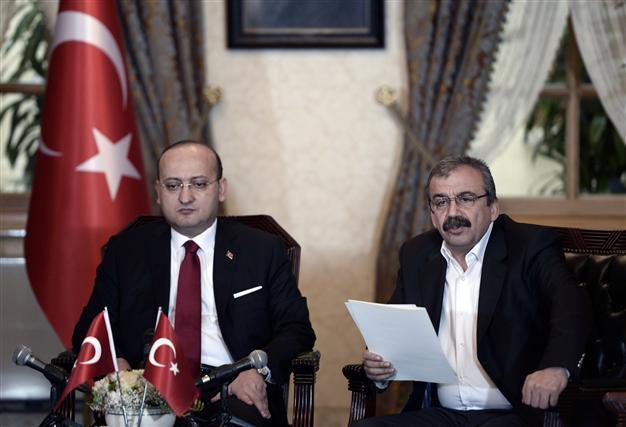Erdoğan’s denial of ‘Dolmabahçe Agreement’ sparks row
ANKARA

AFP photo
A senior governmental official has denied reports suggesting that President Recep Tayyip Erdoğan had knowledge of the content of a key meeting about the peace process even as another participant in the gathering confirmed that Erdoğan even attended the event in question.“The Dolmabahçe news report in Cumhuriyet newspaper is based on distorted and fabricated information to a large extent. The claims concerning our president in the report are not true,” Deputy Prime Minister Yalçın Akdoğan, a participant in the Feb. 28 meeting, said in messages posted to his Twitter account on July 19, the day daily Cumhuriyet published its report saying Erdoğan had been informed of every detail of the meeting at Istanbul’s Dolmabahçe Palace as it occurred.
Pervin Buldan of the Peoples’ Democratic Party (HDP), meanwhile, told Cumhuriyet that the report was “partially” accurate while also voicing regret over a recent statement by Erdoğan which sparked the debate over the Dolmabahçe meeting.
In his statement which Buldan called “unfortunate,” Erdoğan said he did not recognize the term “Dolmabahçe Agreement,” a document outlining a 10-item list of priorities for the resolution of the Kurdish issue.
With the document, the jailed leader of the outlawed Kurdistan Workers’ Party (PKK), Abdullah Öcalan, urged the PKK to hold a congress in spring to discuss disarmament in Turkey.
Öcalan issued his first call on the PKK to declare a cease-fire in 2013, while a joint press conference between the government and the HDP was held at Dolmabahçe Palace in Istanbul on Feb. 28. Akdoğan and HDP Istanbul deputy Sırrı Süreyya Önder read their own statements, while Önder listed 10 articles which summarized Öcalan’s priorities.
“I do not recognize the phrase ‘Dolmabahçe Agreement.’ There is a government. So there is a political party with its grassroots [from the PKK]. If there is a step to take for the future of our country, this should be made in parliament. There cannot be an agreement with a political party that is being supported by a terrorist organization,” Erdoğan told reporters after he performed Ramadan prayers at a mosque in Istanbul’s Ataşehir district early July 17.
Nonetheless, Cumhuriyet provided details suggesting that Erdoğan was closely involved in the meeting which was attended by former Interior Minister Efkan Ala, AKP Deputy Parliamentary Group Chair Mahir Ünal and the HDP’s Buldan and İdris Baluken, in addition to Akdoğan and Önder.
According to the report, even disagreements between the AKP and the HDP on the wording of the final statement, as well as over the seating arrangement during the announcement of the statements, was resolved with Erdoğan’s intervention over the telephone.
“I consider Mr. President’s statement as unfortunate,” Buldan said, arguing that Erdoğan’s approach was related to the HDP’s success in the June 7 parliamentary election because the success hampered Erdoğan’s aspiration to transform Turkey’s parliamentary system into a presidential one.
The AKP lost his parliamentary majority as the HDP passed the 10 percent threshold and ensured the AKP dropped to fewer than 276 seats in parliament, the number needed for a legislative majority. It had aimed for 330 seats, which it needed in order to change the constitution without input from other parties and thus pave the way for a new presidential system equipped with more power and fewer checks and balances.
















